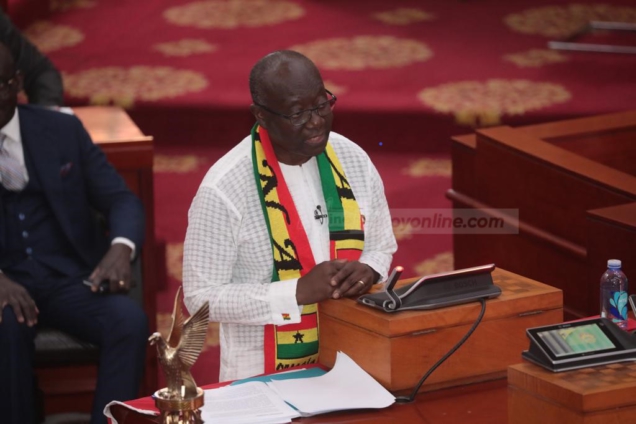Under the new proposal, the government is offering an upward adjustment of the principal by 15% right from the start. So, for example, if you hold a bond with a face value of GHS 1,000 today which matures in 2027, the new bond gives you GHS1,150 right from the start.
The government would pay an average coupon rate of 8.4% per annum and an additional 10% cash payment every year.
In 2023, the government would pay 5% out of the 8.4% coupon rate. The other 3.4% is added to the principal of GHS 1, 150 which comes to GHS 1,189.1 at the end of 2023.
In 2024, the government pays 5% on the capitalized principal of GHS 1,189.1 and the remaining 3.4% is capitalized to send the new principal to GHS 1,229.53 at the end of 2024.
In 2025, government now pays 8.4% on GHS 1,229.53. This remains the same for 2026 and 2027.
In terms of the cash flow implications, this means you will receive coupons of GHS157.5, GHS159.46, GHS203.28, GHS203. 28, and GHS203.28 in 2023, 2024, 2025, 2026 and 2027 respectively. In 2027, you will also receive a principal of GHS1,229. 53
In comparison, the old bonds at an average coupon rate of 18.5% will pay a coupon of GHS185 every year and a principal of GHS 1,000 in 2027.
If you discount these cash flows using the 18.5% prevailing on the old bonds, the present value for the future streams of cash flows under the old bonds gives you GHS 1,000 just as your face value today. This means NPV is zero. But if you discount the future cash flows under the new offer at the same 18.5%, you get a positive NPV of GHS85. This means the new bonds are offering a return of more than 18.5%. In fact, around 21% per annum.

I must mention, however, that the two rates of return (under the old and the new) are below the current inflation rate, meaning that the real return is actually negative for both. But the new one is better because it minimizes the negative returns.
If you stick to the old bonds, you earn an average of 18.5% per annum till maturity. It will not change. With the new bond, the return is slightly higher than 20% (About 21%).
I must also add that from the cash flows, it means that the government is pushing most of the payments to the next government (NPP/NDC) in 2025 and beyond. If NPP wins, they will continue with their creation and if NDC wins, they will inherit a huge cash outflow burden. But these arguments are for the politicians to make.
Latest Stories
-
Give direct access to Global Health Fund – Civil Society calls allocations
3 hours -
Akufo-Addo commissions 200MW plant to boost economic growth
4 hours -
Smallholder farmers to make use of Ghana Commodity Exchange
4 hours -
I want to focus more on my education – Chidimma Adetshina quits pageantry
4 hours -
Priest replaced after Sabrina Carpenter shoots music video in his church
4 hours -
Duct-taped banana artwork sells for $6.2m in NYC
4 hours -
Arrest warrants issued for Netanyahu, Gallant and Hamas commander over alleged war crimes
5 hours -
Actors Jonathan Majors and Meagan Good are engaged
5 hours -
Expired rice saga: A ‘best before date’ can be extended – Food and Agriculture Engineer
5 hours -
Why I rejected Range Rover gift from a man – Tiwa Savage
5 hours -
KNUST Engineering College honours Telecel Ghana CEO at Alumni Excellence Awards
5 hours -
Postecoglou backs Bentancur appeal after ‘mistake’
5 hours -
#Manifesto debate: NDC to enact and pass National Climate Law – Prof Klutse
6 hours -
‘Everything a manager could wish for’ – Guardiola signs new deal
6 hours -
TEWU suspends strike after NLC directive, urges swift resolution of grievances
6 hours

